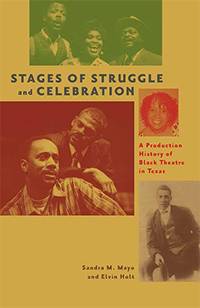Ritual

Stages of Struggle and Celebrations: A Production History of Black Theatre in Texas
by Sandra M. Mayo and Elvin Holt
Austin: University of Texas, 2016.
344 pp. $29.95 paper.
Reviewed by
William Jensen
This is an important and wonderful book. Sandra M. Mayo and Elvin Holt have put together the definitive book on black theatre in the Lone Star State. Stages of Struggle and Celebration showcases the depth and wide range of performances by African Americans in Texas, and the authors go into an amazing amount of detail regarding various productions, playwrights, directors, actors, and history. This book proves that community and love are still what matter most.
The book consists of two sections, but the entire work is an overview of the theatre organizations throughout Texas—specifically focusing on San Antonio, Austin, Fort Worth, Dallas, and Houston. There is also an afterword. The first part is simply titled “Setting the Stage,” and it presents the book’s definitions for black theatre. This segment functions as a survey of the history of black theatre in Texas up to the present. The second part, “Their Place on the Stage,” consists of five chapters that individually analyze the history of black theatre in a specific city. The first section alone should be required reading for anyone interested in the subject of theater or African American literature. This piece sets up everything about black theatre from the days of slavery to minstrel shows to the first black theatres and theatrical productions in Texas.
The second section of the book is much longer and is incredibly thorough. In fact that would be my only criticism—Holt and Mayo know their subject well and nothing is left out, so some readers may feel overwhelmed or exhausted. But I much rather have everything at my fingers than left scratching my head and wanting more. The authors tackle each mentioned city and every black theatre in those cities with an encyclopedic knowledge.
Out of all the cities covered in Stages of Struggle and Celebration, the chapter covering Dallas is the richest. This chapter introduces readers to Curtis King who was the founder and president of The Black Academy of Arts and Letters. King’s involvement with TBAAL in Dallas has clearly been a life of hard work and good will. It was Curtis King’s mission to develop one of the most progressive cultural arts center in the country, and he transformed Dallas into one of the strongest places for African American theatre in the United States.
In the afterword, the authors mention that the “story of black theatre in Texas centers on the celebration of black life.” And black life needs to be celebrated. Similarly, black theatre should be acknowledged for being some of the best theatre in Texas and the rest of the nation. Contemporary American theatre is often ignored these days in favor of the whiz-bang effects on the silver screen. But theatre isn’t just entertainment to ease the passing of time, theatre is necessary. Theatre is where people come together to witness the issues of life, the conflicts of community be addressed. Theatre is vital. Theatre is ritual.
William Jensen is the editor of Texas Books in Review and Southwestern American Literature. His novel Cities of Men will be published in May of 2017.
